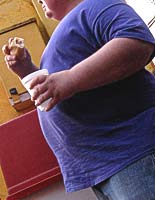
In 1973, when a major tobacco company was looking for ways to get children and teenagers to buy its cigarettes, a company executive wrote: “[W]e are presently, and I believe unfairly, constrained from directly promoting cigarettes to the youth market… Thus we need new brands designed to be particularly attractive to the young smoker…” For a while, the industry’s aggressive attempts to entice young smokers were shamefully successful, but public health campaigns over the past 40 years ultimately reversed the trend and dramatically brought down the smoking rate among America’s youth.
Childhood obesity, on the other hand, has tripled since 1980. At $215 billion a year, the cost of obesity to the national economy – in public and private medical spending and lost productivity – has surpassed the cost of smoking. And food companies, which continue to target high-fat, high-sugar and high-sodium foods at America’s children, are using the same deceptive and misleading tactics that the tobacco industry mastered to cover their tracks as they pursue profit at the expense of public health.
Case in point: the Sensible Food Policy Coalition
In 2009, Congress instructed a working group of federal agencies responsible for public health and consumer safety to recommend a set of standards for marketing food to children. The working group came up with a set of draft recommendations proposing that food companies take it upon themselves – voluntarily – to advertise to children only those foods that make a meaningful contribution to a healthful diet and contain only a small amount of fat, sugar and sodium.
That modest proposal was too much for the food industry, however. Fearing that publicity about their child-targeted marketing of sugary, salty and fatty foods would be bad for business, food and media companies ripped a page from the tobacco playbook and began an aggressive lobbying campaign, cloaking it under a benign-sounding name – the Sensible Food Policy Coalition.
A front group for food and media giants
Though it paints itself as a consumer advocate “ensuring choices in nutrition for America’s families” and working to “keep the government out of your kitchen,” the Coalition is actually a group of food and media corporations including PepsiCo, General Mills, Kellogg’s, Time Warner and Viacom that work through a law and lobbying firm that also represents a major tobacco company.
Visit the Coalition’s website and you’ll find nothing explicitly identifying the Coalition’s members. In fact, a search for the site’s owner reveals that the Coalition is paying a third party to ensure its online anonymity. The site is registered to DomainsByProxy.com so that it cannot be linked to any of the member companies.

And when you call the main number for the Sensible Food Policy Coalition (202-783-3300), a receptionist at the Washington, D.C. law and lobbying firm of Polsinelli Shughart answers and patches you through to the “coalition,” otherwise known as James Davidson. He’s a top lobbyist for the junk food industry and a shareholder at Polsinelli Shughart, whose clients include cigarette manufacturer R.J. Reynolds.
False claims about the proposed voluntary federal guidelines
Davidson has posted false and misleading information on the Coalition’s website and is making the rounds on the radio circuit. The website claims that under the proposed marketing guidelines, “88 of the 100 most-consumed foods are banned.” In reality, the proposal doesn’t even come close to banning a single food – let alone 88.
No food or advertising would be banned under the guidelines. The director of the Bureau of Consumer Protection at the Federal Trade Commission, David Vladeck, has emphasized that the proposal “provides no basis for law enforcement action by the FTC or by any of the other agencies… It’s voluntary.” And while the guidelines propose changes in advertising practices, they say nothing about which foods can or should be on the market. They make recommendations about advertising practices – specifically advertising to children – but not about food production or sales.
Moreover, the list of 88 foods the Coalition cites includes beer, donuts, black coffee, chocolate candy bars and ice cream – hardly products that should be promoted to children at a time when nearly 35 percent of America’s youngsters are struggling with overweight and obesity.
In his radio appearances, Davidson insists that although “childhood obesity has many … contributing causes, advertising is not one of them, and that’s the conclusion of the very prestigious Institute of Medicine.” The experts at the Institute must be very surprised to hear that. What their study actually found was that “there is strong evidence that exposure to television advertising is associated with adiposity in children ages 2-11 years and teens ages 12-18 years.” (Adiposity is a medical term referring to body fat.) The study stopped short of declaring a direct causal relationship between food advertising and obesity, but it concluded that if industry failed to shift “the emphasis away from high-calorie and low-nutrient foods and beverages… Congress should enact legislation mandating the shift on both broadcast and cable television.” A subsequent study, published in the American Journal of Public Health in 2010, also concluded that “television advertising, rather than viewing per se, is associated with obesity.”
Using a lobbying front group to push bad science
Cigarette companies for years hired advertising agencies to help target young people, paid lobbyists to push misinformation and established front groups to dispute the science documenting the health dangers of smoking. So this is hardly the first time that industry groups have tried these tactics. It isn’t even the first time that these very food companies have played this game! In 2005, in the face of growing pressure from government and public health advocates, the same companies hired the same lobbyist to promote the same type of front group.
That was the year they created the Alliance for American Advertising – composed of General Mills, Kellogg’s, Kraft and various advertising associations. It has claimed for six years to be “fighting childhood obesity,” but in reality it has been fighting public health measures that address the problem. Now it, too, is lobbying against the proposed food marketing guidelines.
Surprise, surprise. The Alliance’s director is none other than James Davidson. Its website is also owned by DomainsByProxy.com, and its phone number and mailing address are identical to those of the Sensible Food Policy Coalition. As recently as this spring, Davidson and his lobbying group were paid $120,000 to lobby and meet with the White House, both houses of Congress and all four agencies involved in formulating the food marketing guidelines, according to lobbying registration documents.
These food and media groups are protecting their ability to bombard children with advertising on television, the Internet, social media and smart phones. The onslaught of messaging, marketing and promotion of sugar, salt and fat in the form of “food” and “beverages” plays a central role in the obesity epidemic among America’s children.

Protecting Big Food’s bottom line
By creating and funding a deceptive lobbying effort to undermine a voluntary, science-based initiative to protect children’s health, Big Food is challenging the dozens of medical groups and public health advocates who support the advertising guidelines.
In a remarkably transparent moment during a recent interview, James Davidson made it clear that it’s not children’s health that he, the industry and the Coalition are truly concerned about.
“It is absolutely critical,” he insisted, “that advertising be maintained in a healthy state in this country.”


.jpg?h=827069f2&itok=jxjHWjz5)
